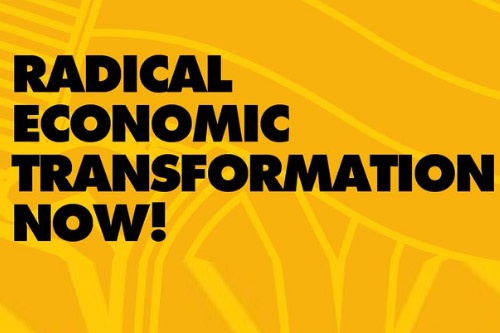I have heard this term being brandished back and forth for quite some time now, but it is unclear exactly where the term was founded or where it was first used. In March 2015, Zuma addressed the Broad Based Black Economic Empowerment Council and emphasised the urgency of implementing the government’s economic policy. Former Deputy Minister, Buti Manamela mentioned that such a radical economic transformation should target support for black industrialists and that government would have to “turn
the figures at the stock exchange on its head.”
Interestingly enough, it was just after this time that the Bell Pottinger Private Communications Ltd. (BPP Communications Ltd.), a multinational public relations, reputational management and marketing company based in London, United Kingdom became involved with both the Gupta family and the South African government. Bell Pottinger conceived the phrase ‘White Monopoly Capital’ which was used as part of a public relations and social media strategy to influence public opinion and sow racial division in South Africa. Government ministers who were perceived to be hostile towards the Gupta family saw accusations being levelled against them of promoting ‘state capture’ for ‘white monopoly capital’. Ultimately this disastrous campaign led to the demise of Bell Pottinger. Bell Pottinger also actively promoted the term ‘Radical Economic Transformation’ whilst carrying on its despicable public relations campaign. I am left to wonder if they took any cognisance of the hard work done by people like Nelson Mandela and F.W. De Klerk in order to sow racial harmony and to have it undone in pursuit of a quick buck.
With the amount of graft having been perpetrated by large western companies during the Zuma administration, one is left to wonder whether or not these foreign-based liberal minded people actually had the welfare of the average black man in Africa at heart when they supported the removal of the minority white government, or whether they simply were in the wings waiting for the ‘right man’ i.e. completely corrupt leader to take control and they would be ready to pounce. Almost every nation has had at least one crooked company climb in – USA with McKinsey, Switzerland and ABB Controls, Germany and SAP, UK with Bain and Co. The list simply goes on and on and the countries include Spain, Australia, Russia, and more. But, I digress. Apologies.
Unable to answer my first two questions about its initial use and its origin I am left to question its meaning. Sanjay Balkaran of the faculty of commerce and administration from the Walter Sisulu University released a long-winded paper which took great pains to describe political and economic ills pre-1994. Prior to exploring several reasons and consequences of poor economic policies pursued by the Zuma-led ANC government, the paper notes that this form of ‘Radical Economic Transformation’ (RET) falls outside
mainstream economics but is rather used as an alluring and intoxicating slogan.
Scouring the internet, I was left empty handed and unable to understand, definitively, exactly what is meant by RET.
The free and easy use by politicians, and especially by those politicians from the ‘Progressive Caucus’, whose members include the Economic Freedom Fighters, uMkhonto we Sizwe and other far left-wing parties, whose members have an abysmal track record of creating sound governance structures within government structures. Hence the entire phrase, ‘Radical Economic Transformation’ is perceived by many as a slogan aligned to corrupt, and or, state captured politicians.
Is the term ‘Radical Economic Transformation’ really a term? Or is it merely an excuse to provide contracts and other economic benefits to ‘friends and connected ones’? If we accept that ‘Radical Economic Transformation’ is actually just an ‘excuse’ or indeed a ‘slogan’ used to justify poor selection of service providers then the question must be asked: How close is ‘Radical Economic Transformation’ to ‘Broad Based Black Economic Empowerment (BBBEE)’? It appears that BBBEE is also the convenient excuse of so many incompetent politicians as to why contracts and other government procurement has been channelled to ‘tenderpreneurs’ who have all too often ‘taken the money and run’. Any white person who has the audacity to question why things have gone wrong are labelled as ‘racist’!
Fortunately, it does seem that things are changing. A new, young, black, and very organised motivated youth are starting to climb into middle management and demanding results, not excuses. This has become very inconvenient for the old political stalwarts who Ramaphosa had insisted on recycling in his governments of old. The new direction that the political winds of change have chosen with the ‘Government of National Unity’ is certainly a breath of fresh air. It is a pure delight to bid farewell to
some proper fools, Beke Cele, Lindiwe Sisulu, and Dlamini Zuma, to name a few. They have been replaced by hopefully more competent people who, at first glance, have made the right noises. Gayton Makenzie has certainly stirred things up about the removal of incompetent ‘friends and connected ones’.
The proof of the pudding will be in the eating over the next couple of years.
Entrepreneurs know that employing the best person for the job is critical to success. There is no room to employ passengers as budgets are tough and money definitely does not grow on trees. Appointing contractors is a delicate and difficult mine field to navigate ensuring that we obtain the best quality product or service at the best possible price. Prices too low could result in inadequate quality, timing or other deficiencies, but we are programmed not to be ripped off.
The game is on!
We are ALL people, and we ALL make mistakes. Entrepreneurs are no different to other people and we don’t like to make mistakes. It costs us money. We know just how hard it is to make that money in the first place and now to have it swiped out of our back pocket is a real heart wrenching moment. Don’t let your pride go looking for the RET or BBBEE excuse or slogan to absolve you from blame. Rather spend your time identifying what went wrong, what was the root cause and how it can be avoided in the future.
Be safe and happy entrepreneurism.
Peter Carlisle CA (SA)
July 2024





